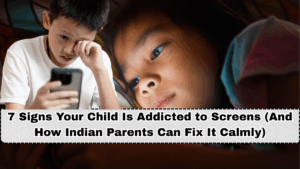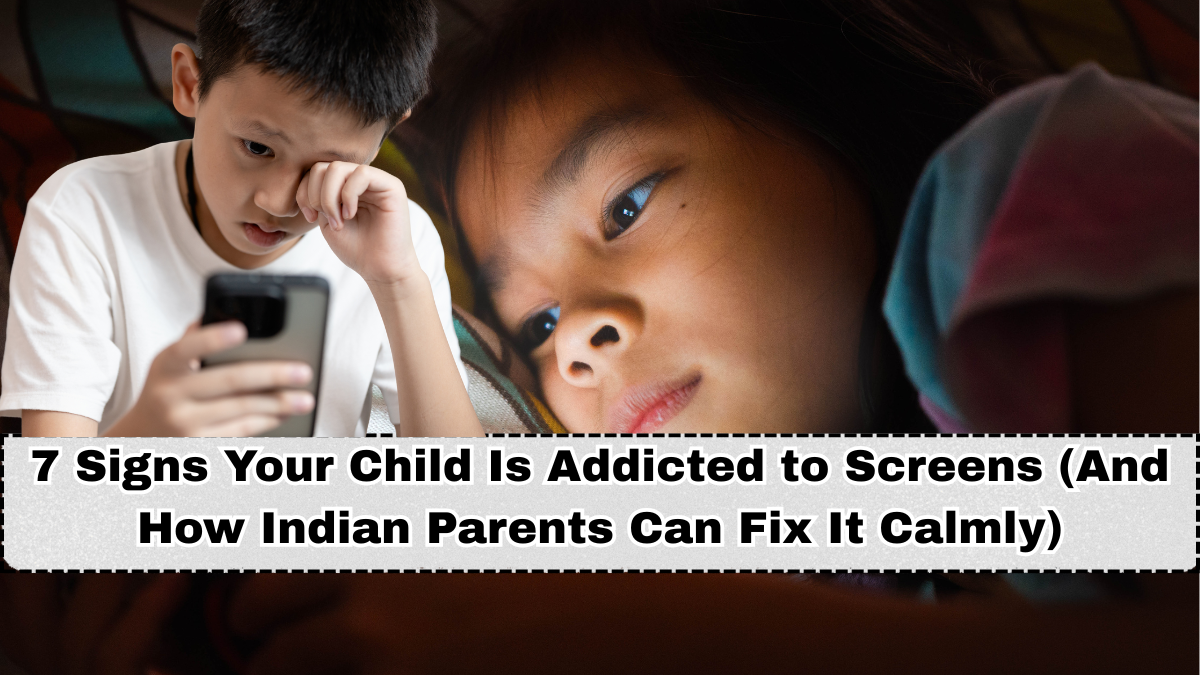In 2025, Indian parents are facing one of the toughest modern parenting challenges—Screen addiction signs in kids India are rising fast as children spend more time on YouTube, reels, mobile games, OTT platforms and online classes. Screens have quietly become digital babysitters for busy parents, leaving kids overstimulated, under-rested and emotionally fragile. What begins as “just 10 minutes of phone” often turns into hours of scrolling, sudden tantrums and dependence on digital entertainment. Many parents feel guilty or helpless—but screen addiction is reversible when understood early.
The biggest concern today is that screen addiction affects not just behaviour, but also brain development, attention span, emotional maturity, sleep quality and social skills. Children between 3 and 16 years are registering daily screen times far above safe limits. With online distractions everywhere, kids now crave quick dopamine hits from reels, shorts and games. If your child faces sudden irritability, poor sleep or withdrawal from real-life activities, these may already be signs of digital overload. The key is recognising the early patterns before they become long-term habits.

Why Kids Are More Vulnerable to Screen Addiction
Children are neurologically wired to seek excitement, novelty and instant gratification. Modern apps and games are designed exactly for that—bright visuals, fast edits, rewards and autoplay features. When these patterns repeat, the brain becomes dependent on continuous stimulation.
Indian households, where parents juggle work, chores and family responsibilities, often give screens to keep children occupied. This unintentional habit becomes a routine, and slowly, screen time replaces playtime, outdoor activity, reading, and even emotional expression. As a result, Screen addiction signs in kids India are becoming common across both urban and rural families.
Let’s break down the early warning signs Indian parents should never ignore.
7 Clear Signs Your Child Might Be Addicted to Screens
1. Tantrums When You Take Away the Phone
If your child cries, shouts, argues or becomes aggressive the moment you take the device away, it’s a strong sign of dependency.
2. Prefers Screens Over Outdoor Play
Children naturally love running, jumping and exploring. If they choose mobile over cycling, park time or toys, the balance is disrupted.
3. Difficulty Sleeping or Staying Asleep
Blue light and fast-paced content overstimulate the brain. Kids who watch screens before bedtime often struggle with sleep quality, nightmares or late-night restlessness.
4. Loss of Interest in Studies or Hobbies
Children addicted to screens lose patience for slow activities like reading, drawing or homework. They prefer high-energy digital content.
5. Constant “I’m Bored” Without the Phone
Kids addicted to screens find it hard to engage in imaginative play and constantly rely on devices for entertainment.
6. Eating Only While Watching Videos
If your child refuses to eat without cartoons or reels playing, it indicates behavioural dependency on screens.
7. Reduced Social Interaction
Kids may avoid talking to parents, siblings or friends, preferring the virtual world instead. Emotional connection starts weakening.
These behaviours strongly indicate growing digital dependence, and parents should respond early with calm, consistent action.
How Screen Addiction Affects Kids’ Health in 2025
Screen addiction impacts children in multiple ways, often subtly:
• Shortened attention span due to fast editing and overstimulation
• Higher irritability as the brain becomes dependent on dopamine hits
• Weaker emotional regulation because kids don’t learn patience or delayed gratification
• Poor posture and headaches due to prolonged mobile use
• Lower academic performance as focus declines
• Sleep disorder patterns, including insomnia and early waking
• Social skill decline, making real communication harder
These effects highlight why early intervention is crucial for Screen addiction signs in kids India, especially for school-going children.
A Calm, Practical 5-Step Plan for Indian Parents
Sudden bans or shouting never work—in fact, they increase rebellion. A slow, structured plan works best:
Step 1: Reduce Screentime Gradually
Cut daily usage by 10–15 minutes each week. Sudden removal creates frustration.
Step 2: Create Screen-Free Zones
Dining area, bedroom and study table should be strictly no-screen spaces.
Step 3: Replace, Don’t Remove
Replace screen time with fun alternatives—colouring, puzzles, board games, park visits, storytime, dance or music.
Step 4: Delay Morning Screen Exposure
Never start the day with a phone. It sets the child’s brain for instant stimulation.
Step 5: Be a Screen-Responsible Parent
Children copy what they see. Reduce your own scrolling, especially around kids.
These simple steps help create a healthy digital routine without fights at home.
How to Strengthen a Child’s Brain Away From Screens
Children thrive on creativity, curiosity and physical activity. Add these habits to protect cognitive development:
• 1 hour of outdoor play
• Evening family walk
• Daily reading time
• DIY crafts
• Group games
• Emotional check-ins
• Early dinner + early sleep
These activities build real-world skills that screens cannot.
When Should Parents Consider Professional Help?
If screen addiction severely affects behaviour, sleep or academics, consulting a child psychologist can help. Early guidance prevents long-term patterns and emotional barriers. Indian schools in 2025 are also offering digital detox programs and counsellor support for students.
FAQs
What is the biggest early sign of screen addiction in kids?
Tantrums when the device is taken away and refusal to eat without watching videos.
How much screen time is safe for kids?
Ideally under 1 hour for ages below 6, and under 2 hours for ages 6–16.
Can screen addiction affect attention span?
Yes, overstimulation from fast-paced content significantly reduces focus and patience.
How can parents reduce screen time peacefully?
By reducing gradually, offering alternative activities, and modelling good behaviour themselves.
Is screen addiction reversible?
Fully reversible with consistent routine changes, healthy alternatives and proper sleep.
Click here to know more.
